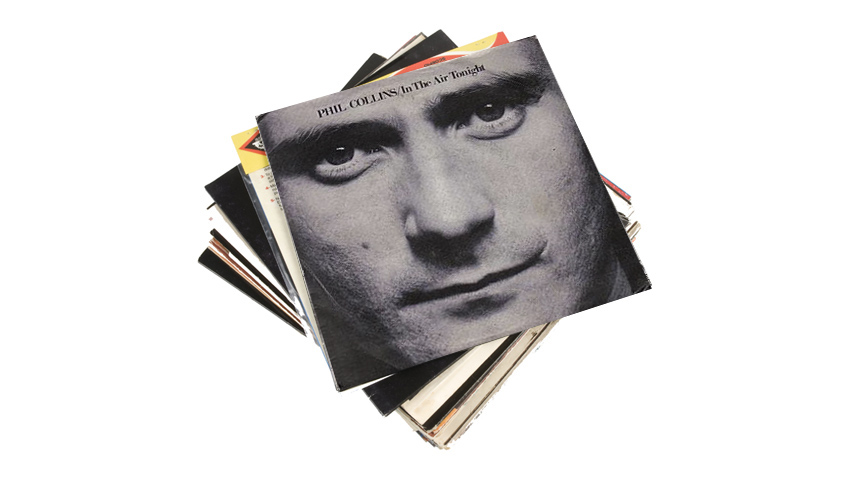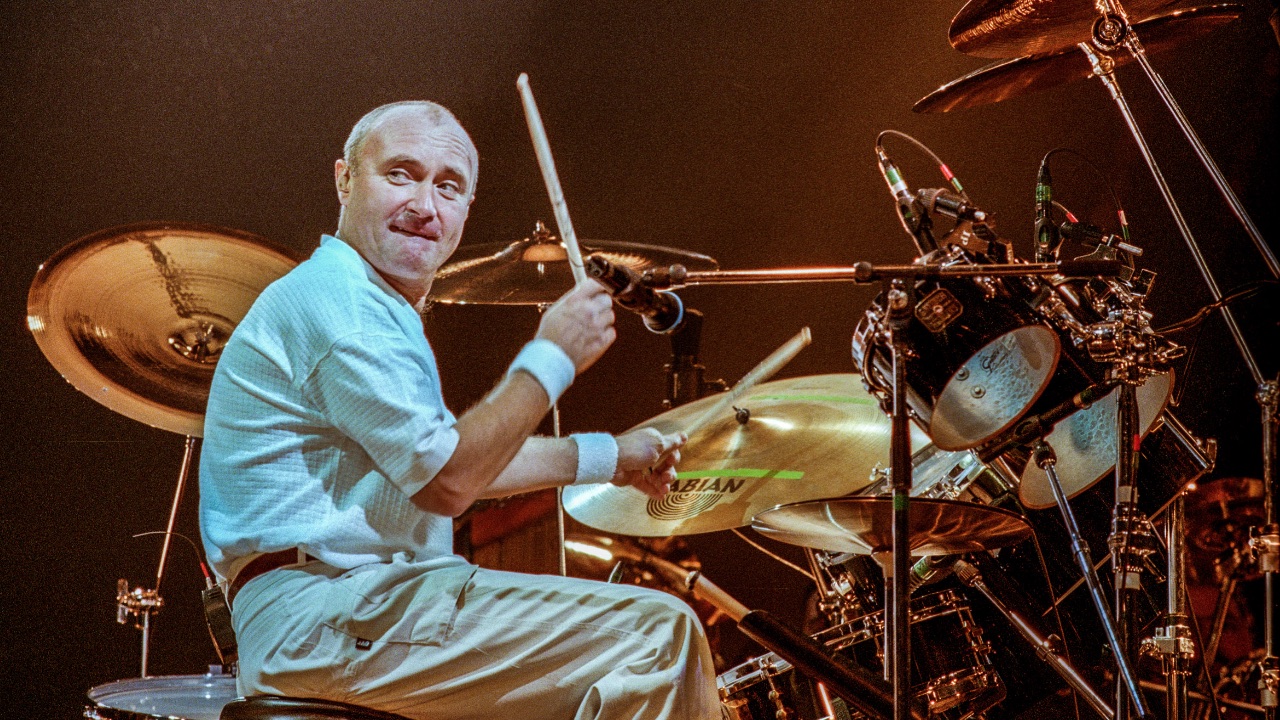5 tracks producers need to hear by… Phil Collins
Best of 2022: The definitive essential cuts for producers who are yet to get their Phil…

Want all the hottest music and gear news, reviews, deals, features and more, direct to your inbox? Sign up here.
You are now subscribed
Your newsletter sign-up was successful
Join us for our traditional look back at the stories and features that hit the spot in 2022
Best of 2022: For too long Phil Collins has had it too tough. Forever caught between two (drum) stools his (successful, million-selling) pop ‘n’ power-ballads are too schmaltzy and lightweight for worshippers of his ‘proper’ music, while his early-doors prog yarns are yards too batty for non-Nigels.
But as he calls time on his near-60-year career, it's time to take stock and acknowledge the man's massive contribution, and enjoy a stroll through his bulging back catalogue.
Against all odds we’ve picked just five of our favourites from the man responsible for more tom fills than Eastenders PLUS we turn it on again for more of Phil’s finest for our further listening. Hit it!
1. Sussudio
THIS is Transatlantic Collins at the top of his game
Collins circa ’83/’84 was a huge Prince fan, listening to his 1999 album continuously while on the Mama world tour with Genesis. Inevitably when it came to demoing songs for his next album in late ’84 (which would become the all-conquering No Jacket Required in ’85) the purple one subconsciously exerted his influence...
The story goes that while co-producer Hugh Padgham loved Sussudio’s demo – and was all for its inclusion on the album as an upbeat foil to some of the more gloomy tracks from Collins piano-tinkling, mid-break-up ‘Jacket’ period – Collins himself fretted over its innate similarity to Prince’s party classic.
In original demo form – here – the similarity is indeed worryingly problematic. (Do listen out for Collins’ nonsense lyrics as he crudely etches out the track’s melody in spur-of-the-moment made-up words – not least the track’s title). However, Padgham reassured Collins that once their track had a fresh new bass part, no-one would suspect a thing (1999 having one of the most plodding one note basslines of all time, ‘bested’ only by Prince’s own When Doves Cry which has no bassline at all...)
Want all the hottest music and gear news, reviews, deals, features and more, direct to your inbox? Sign up here.

How to create a Phil Collins-style '80s gated reverb drum sound
This perhaps goes some way to explain the next-level complexity of Sussudio’s bassline delivered courtesy of keyboard whizz David Frank, one half of US tech/funk band The System. Frank was flown in to program new keyboard parts – including this track’s incredible rippling bass part – to help take your ears off Collins’ accidental homage and in a whole new, legally sound direction. (If you’re a stranger to The System do take five to check out their classic Don’t Disturb This Groove.)
So while it’s bearded bass legend Leyland Sklar that plays in the video (on a none-more-eighties Steinberger headless bass, no less) it’s David Frank’s left-behind-in-London sequencer part (triggering a MiniMoog) that you're actually listening to.
Certainly in extended 12” form the extra instrumentation – keyboards, guitars and those live horns from Earth, Wind & Fire’s Phenix [sic] Horns – do an excellent job of hazing the track’s origins, even going as far as switching in a Roland 808 rimshot to replace the distinctive down-tuned Linndrum rimshot on Prince’s track. And – sample fans – do treat yourself to a superb ‘Phil Collins ’80s snare drum’ at 0:59 (even if it is straight out of an Oberheim DMX drum machine).
THIS is Transatlantic Collins at the top of his game and ’85 would see him as the only musician to play at both the London AND Philadelphia stages of Live Aid. It was his biggest hit to date with both single and album hitting US number one.
The title, by the way, is – officially – meaningless, Collins always intended to change it to something that actually meant something… but never quite got round to it.
2. In The Air Tonight
Yup. We have to go there. But despite playing on infinite loop at the back of every human’s brain since 1981 (whether they realise it or not) it’s a little known fact that there are actually two distinct versions of this classic in circulation.
The ‘Phil Collins drum sound’ is so much more than gated reverb – the process of imposing a large swath of reverb onto drums only to suddenly chop it off mid-tail with a gate – and is actually the result of a happy accident
The first is the original album version, being track one (side one) on Collins' debut solo album Face Value. This version of the track runs to 5:37 with the vocal arriving a lengthy 0:52 seconds in (this being the first solo record from the lead singer of ponderous poshboy prog rockers Genesis after all). More worryingly the track’s famous drum drop (where the track actually ‘starts’) doesn’t hit until 3:41…
‘Air’ is a dark, brooding, doomy affair powered for the majority of its duration by a simple Roland CR-78 drum machine (playing a lightly edited version of the Disco 2 preset), chords from a Sequential Circuits Prophet 5 and Fender Rhodes, and ambient guitar trickery courtesy of Genesis regular Daryl Stuermer. The occasional glimmers of vocoder come from a Roland VP-330 but mostly its the use of multiple slap-back delays on the vocal that give it its unique sound. However, it’s this definitive meisterwerk that you most likely HAVEN’T been listening to for nearly 40 years…
Despite knowing that they had captured magic, Collins and Padgham came under pressure from Atlantic label boss Ahmet Ertegun for its planned single release. According to Collins when Ertegun came to the studio to listen to ‘Air’ for the first time he was upset that the track appeared to feature precisely zero drums on the first single from one of the world’s most famous drummers… He may have had a point. “The drums come in in a minute,” explained Collins but Ertegun was insistent: “Yeah, you know that, but the kids don’t know that. You’ve got to put the drums on earlier.”
Rattled, Collins and Padgham created an edit (running to 5:01, the vocal arriving at a more reasonable 0:36 and the drum drop at 3:15). They also went one further, effectively ruining the track’s drop and electronic stylings by adding real toms and snare work from the start. It’s actually this inferior, compromised version that was released as a single, soundtracks the video and reached number two in the UK and 19 in the US before blasting out of radios for decades.
However in this modern age of streaming there seems to have been a Collins correction behind the scenes. It’s now the superior (longer, original) album version that appears on searches with that 7” mix now impossible to find. Even the streaming versions of compilations Phil Collins: Hits and Phil Collins: The Singles now carry the non-single album version instead. Phew. But don’t worry, we’ve found that iffy 7” mix for you above.
Famously when Collins performed the song for the first time on (legendary UK music TV show) Top of The Pops he sported a pot of paint and a brush at the end of his Prophet 5 (which was propped up on a Black & Decker Workmate) as a jibe to his (first) ex-wife who’d just left him for a painter and decorator. Ouch.

5 videos that hilariously reimagine the Phil Collins In The Air Tonight fill
Oh yes. That drum drop… The ‘Phil Collins drum sound’ is so much more than gated reverb – the process of imposing a large swath of reverb onto drums only to suddenly chop it off mid-tail with a gate – and is actually the result of a happy accident.
The track was recorded on an Solid State Logic 4000 series desk, one of the first mixing desks to feature a ‘reverse talkback’ feature. This allowed the producer to press a button in order to hear the musicians in the studio (‘talkback’ being the more usual process of pressing a button in order to speak to the musicians in the studio).
The reverse talkback circuit on the SSL 4000 featured a simple hardwired compressor, sharply evening out the sound from the studio regardless of how quiet or how far away from the (single, low quality) talkback mic its occupants were.
The story goes that during the recording of Peter Gabriel’s track Intruder (from PG’s third solo album, with Collins on drums and Padgham engineering) Collins played with the reverse talkback feature accidentally engaged allowing Padgham to simultaneously hear the carefully mic’d kit AND the crudely compressed, reverse talkback output of the lively room at the same time. A little judicious re-wiring later and the pair were able to record the distinctive combination. Hear Intruder (and the birth of the ‘Phil Collins drum sound’) here.
Worth noting that later revisions of the 4000 allowed users to directly record the reverse talkback output. Should they fancy minting one of the defining records of the 20th century too.
3. Philip Bailey & Phil Collins – Easy Lover
So how does this come about?
Phil Collins – circa ’84 about to become truly global – taking a backseat to the respected (but hardly household) Philip Bailey of Earth, Wind & Fire?… Yes, this is a Philip Bailey record from a Philip Bailey album with an ‘and Phil Collins’ credit, Collins being originally employed purely as producer.
Finding himself at a loose end post Genesis tour, Collins jumped at the chance of producing Bailey, of whom he was a huge fan. At the end of the sessions (for what would become Bailey’s Chinese Wall album) Bailey pointed out that they’d not actually written anything together and this jam was the result. The story goes that they recorded it on the same night they wrote it.
While it can be argued that Bailey needed global star Collins far more than vice-versa, it’s worth remembering that Bailey was co-lead vocalist (with Maurice White) with Earth, Wind & Fire and was actually more used to sharing a vocal. Collins on the other hand, got to pretend he had the fruity rich stylings of Maurice White for the day (despite on the record sounding as thin and reedy as the famously falsetto Bailey).
Collins not only contributes co-writing, duet vocal and production skills but also plays keyboard and turns in a textbook Collins, big, all-live, drum performance too. Classic.
Also, the video features Phil Collins getting his hair cut. Not something you see every day.
4. Against All Odds (Take A Look At Me Now)
Of all of Collins power ballad output it has to be this one. The track with the idiot-proof double title actually originally had a third, being known as How Can You Just Sit There? when it went unused on both Collins’ first AND second solo albums. And it seems the track nearly had a FOURTH title too as in the first of the track’s only two choruses Collins inexplicably sings ‘against the odds’ but corrects himself to the song’s actual title (‘against all odds’) at the end of the second.
Offered up as a simple way to meet a soundtrack obligation to a movie director, it sits in the no-man’s land between second and third Collins albums, alongside Easy Lover also on our list. It finally appeared on the soundtrack to the movie of the same name, though both ‘lost’ classics have since appeared on Collins’ compilations.
Nevertheless, despite its origins as a near also-ran, the track went on to be a US number one and UK number 2 and became one of the defining ‘power ballads’ of the ’80s.
If you’ve not heard it yet, we suggest you gain a new appreciation of this well worn classic by checking out Collins’ gorgeous, tape-hissy demo version, finally released as part of 2016’s Face Value (Deluxe Edition) anniversary re-release.
Produced by production legend Arif Mardin – AAO(TALAMN) is the only Collins record ever to not be at least co-produced by the man himself – and Mardin does an excellent job saving this potentially net-slipping classic, delivering a gargantuan movie-ready mix and even giving us his own over-the-top, reverse gated reverb take on ‘the Phil Collins drum drop’ at 1:33.
5. Genesis – Firth of Fifth
The hilarious play on words of the title – being a pun on the name of the estuary of Scotland’s River Forth, known as the Firth of Forth – sets the scene nicely… Yes, brush your beard, flap your flares and fire up a steaming vindaloo, it’s finally time to go full-on prog rock!
It’s easy to forget that Collins was merely the hairy Gollum-like drummer with an overblown prog band at his… um… genesis, and many of his most remarkable contributions will forever lie swathed in the swirling Arthurian mists of 9:37 rock operas such as this one.
And WTF time signature is that, you’re wondering? It’s 13/16 and 15/16 with alternating bars of 2/4. Obviously
While technically a Peter Gabriel jam (Gabriel being the original Genesis lead vocalist with Collins as drummer) Collins stepped into the centre spot upon Gabriel’s departure, fulfilling a dual role on what were – let’s face it – all of Genesis’s actual hits.
While Gabriel’s studio version from Selling England By The Pound is excellent, we prefer the Collins-fronted, big, airy live take from the band’s 1977 album Seconds Out (below), with Collins stepping up front for vocals before ‘retiring’ back behind the kit to batter the hell out of the song’s stunning operatic core.
The original studio recording features this complex piano part right at the start but – due to the touring necessity of not carting around a concert grand – keyboardist Tony Banks reluctantly forwent his intro due to simply not having the right instrument to play it on. The result is that the magical, perception-altering ‘drop’ of the song on Seconds Out finally reveals itself at 3:28 and ‘Firth’ is all the better for it.
Do give it the benefit of your doubt and stick around for the amazing Synth Vs Drums battle from 2:04 to 4:42 with Collins clattering out one of prog’s finest performances alongside jaw-dropping 100% live keyboard work from ‘stoney’ Tony Banks. Oh, and Steve Hackett’s solo work immediately after from 4:42 to 7:33 is pretty damn mind-blowing as well.
And WTF time signature is that, you’re wondering? It’s 13/16 and 15/16 with alternating bars of 2/4. Obviously.
Extended remix: And then there were three (more)… Here’s your final Phil further listening
Frida – I Know There’s Something Going On
Once you know it, it’s obvious. This breakout solo release from the soon-to-be-ex-ABBA co-vocalist is of course produced by Collins, who also provides drums and backing vocals. IKTSGO successfully delivered the more credible, rock sound Frida was looking for, but the ABBA-loyal legions refused to take a chance on it, meaning it only reached 13 in the States and stalled at 43 in the UK.
We love this cheesy time capsule. This over-blown 6:16 ‘concept video’ featuring expensively recreated parodies of hits from the time (for an album-milking single only released in the States) passed for a) cutting edge, b) clever and – perhaps most surprisingly – c) funny. Ah, come on. It was 1985. Just go with it. And musically it’s the harder, faster, cooler younger brother to Collins’ 1996 ‘WTF’ career cyanide Dance Into The Light… Listen closely.
If you’re a Collins fan who’s so far kept their Genesis powder dry we implore you to dip into ‘not-prog-but-still-mad’ period Genesis for a combo that’s the perfect Collins-complimenting pop/prog collision. And we’d rather take a million Abacabs than cop a single Invisible Touch… Keep It Dark (from the album Abacab) just edges it over the equally mysterious title track. Try anticipating the synth and drum drop at the start… See what we mean? And that guitar riff… Looping… Over and over… And over… And over… It’s unhinged… But it’s genius.
Daniel Griffiths is a veteran journalist who has worked on some of the biggest entertainment, tech and home brands in the world. He's interviewed countless big names, and covered countless new releases in the fields of music, videogames, movies, tech, gadgets, home improvement, self build, interiors and garden design. He’s the ex-Editor of Future Music and ex-Group Editor-in-Chief of Electronic Musician, Guitarist, Guitar World, Computer Music and more. He renovates property and writes for MusicRadar.com.
